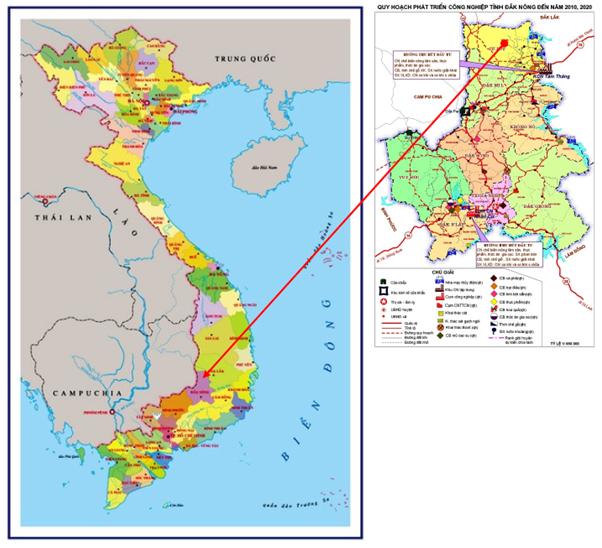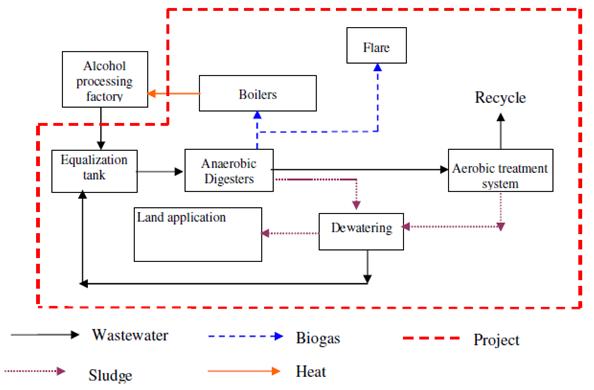Clean Development Mechanism project in Vietnam #Climate Change
You don’t know yet what is a Clean Development Mechanism (CDM)? Watch this video (2:33 min) first!
The CDM helps developed countries to reduce emissions and comply with the Kyoto protocol targets and supports developing countries to undertake investments for sustainable development and emission reduction.
The parties involved in the CDM project I want to share with you are Vietnam as host party with Dai Viet Company Limited and Investment and Trade Consultancy Company Limited; and Germany with RWE Power AG as Certified Emission Reductions (CER) buyer. The following picture indicates its location, which is around 20 km away from Buon Ma Thuot City in Vietnam.
The “Project 4291: Methane Recovery and Utilization Project of Dai Viet Co. Ltd, Vietnam” is a Greenfield project which treats industrial wastewater of Industrial Alcohol processing factory. This factory generates about 2,250 m3/day of wastewater while using cassava to produce 150,000 liters of alcohol. It requires heat from an on-site boiler for the production process.
The CDM project suggests to implement an anaerobic digester treatment system to capture biogas which can be used to heat the boilers in the production process. Furthermore it wants to prevent the release of methane (CH4) into the atmosphere from wastewater treatment. It therefore reduces GHG emissions by capturing the methane and the substitution of the coal as a fuel for the boilers. Here you can see a flow chart with the project boundary:
The baseline scenario: Without the CDM project the wastewater would be kept in open ponds and the methane (CH4) would emit straight into the atmosphere. Additionally the factory would use coal to generate heat to run the boilers. The chance that the project activity would be implemented without the CDM investment is very unlikely, because the proposed technology needs a high initial investment compared with other technologies.
The CDM project will contribute to environmental sustainability by:
- Reducing the emissions of methane and replacing coal by biogas, hence reducing the impact on global warming,
- contributing to a better water quality, and
- reducing bad smells from open ponds.
Additionally the project introduces a new technology in wastewater treatment and plans to build human capacity through training. The estimated reduction will be 119,309 tCO2e GHG emissions annually and the CDM displaces about 11,478 tons of coal.
From the viewpoint of the vulnerability to future climate change this small-scale CDM project has a small positive impact on the climate resilience of Vietnam. The project leads to better water quality in the surrounding areas and hence contributes to food security due to clean water for irrigation. The impact on the human capital is not very high, because this project needs well grounded staff and the number of planned trainings remains unknown.
The German company RWE Power AG has a high knowledge of CDM projects and is very interested to obtain the CERs in order to fulfill the obligation to reduce greenhouse gases. They state, that the investments into CDM projects are “key components of our climate change strategy”.
Resources, last accessed 19.02.2012:
CDM – Executive Board (2006) CLEAN DEVELOPMENT MECHANISM PROJECT DESIGN DOCUMENT FORM (CDM-PDD) Version 03 – in effect as of: 28 July 2006, http://cdm.unfccc.int/filestorage/V/2/Y/V2Y9OTHRUZ4KNQJ1G3CXA0W56EDI7M/4291%20PDD.pdf?t=TmZ8bHpucDZyfDBafcqM3KgVDn3alTKUNPcB
Overview of all documents: United Nations Framework Convention on Climate Change (UNFCCC) Project 4291: Methane Recovery and Utilization Project of Dai Viet Co. Ltd, Vietnam, http://cdm.unfccc.int/Projects/DB/RWTUV1293110791.88/view






.png)
].gif)
.png)
].png)
].png)
].png)
.png)
].png)
.png)
